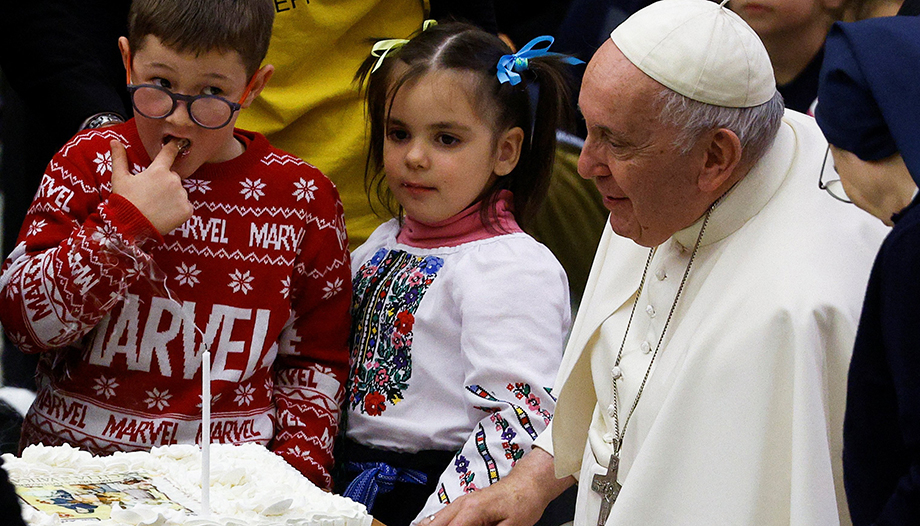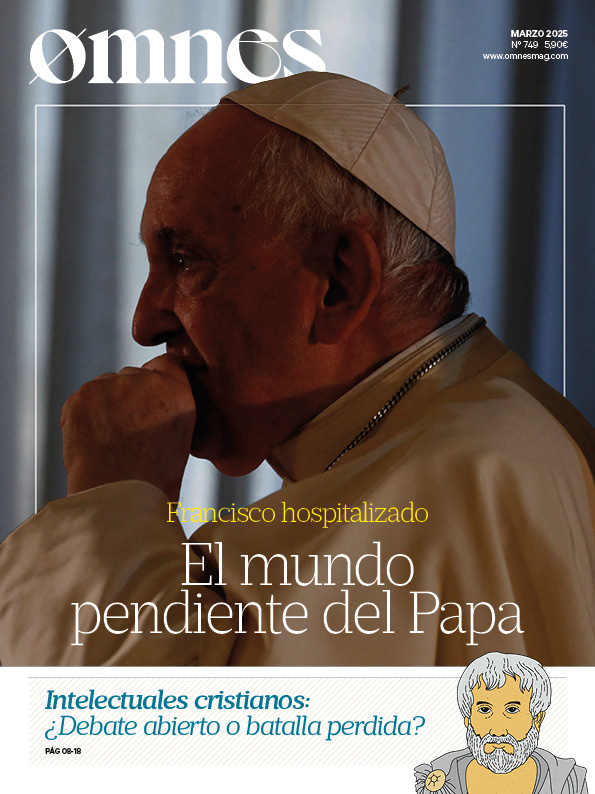Today is his 87th birthday. The first Pope to come from America, the Argentine Jesuit Jorge Mario Bergoglio, former Archbishop of Buenos Aires. It is an opportunity to wish him well, to continue to pray for him, for his health and for his mission of guiding the Church and to enliven the sincere and heartfelt wishes for a fruitful continuation of his magisterium.
The worst thing that can happen in the Church, he explained, "is what de Lubac calls spiritual worldliness", which means "putting oneself in the center". And when he mentions social justice, he invites us to return to the Catechism, the Ten Commandments and the Beatitudes.
The life of Pope Francis
He was born in the Argentine capital on December 17, 1936, the son of Piedmontese emigrants: his father Mario was an accountant, employed by the railroads, while his mother, Regina Sívori, took care of the home and the education of her five children.
After graduating as a chemical technician, he chose the path of the priesthood, entering the diocesan seminary. On March 11, 1958, he entered the novitiate of the Society of Jesus. He completed his humanistic studies in Chile and in 1963, back in Argentina, he graduated in Philosophy at Colegio San José de San Miguel.
Between 1964 and 1965 he taught literature and psychology at the Colegio de la Inmaculada in Santa Fe and in 1966 he taught the same subjects at the Colegio del Salvador in Buenos Aires. From 1967 to 1970 he studied theology, also graduating from Colegio San José.
On December 13, 1969, he was ordained a priest by Archbishop Ramón José Castellano. He continued his preparation between 1970 and 1971 in Spain, and made his perpetual profession in the Jesuits on April 22, 1973. Upon his return to Argentina, he was Novice Master at Villa Barilari in San Miguel, Professor in the Faculty of Theology, Consultor of the Province of the Society of Jesus and Rector of the College.
On July 31, 1973, he was appointed Jesuit Provincial of Argentina. Six years later he resumed his work at the university level and, between 1980 and 1986, he was again rector of Colegio San José, as well as parish priest again in San Miguel.
In March 1986 he traveled to Germany to finish his doctoral thesis; then his superiors sent him to Colegio del Salvador in Buenos Aires and later to the Jesuit Church in Cordoba as spiritual director and confessor.
Appointment of bishop
It was Cardinal Quarracino who wanted him as his close collaborator in Buenos Aires. Thus, on May 20, 1992, John Paul II named him titular bishop of Auca and auxiliary of Buenos Aires. On June 27 he received his episcopal ordination in the cathedral from the hands of the Cardinal himself.
As a slogan he chose Miserando atque eligendo and in the coat of arms he inserted the christogram ihs, symbol of the Society of Jesus.
He was immediately appointed Episcopal Vicar of the Flores area and became Vicar General on December 21, 1993. Not surprisingly, on June 3, 1997, he was promoted to Coadjutor Archbishop of Buenos Aires.
Not even nine months later, upon the death of Cardinal Quarracino, he succeeded him, on February 28, 1998, as Archbishop, Primate of Argentina, Ordinary for the faithful of the Eastern Rite residing in the country and Grand Chancellor of the Catholic University.
In the Consistory of February 21, 2001, John Paul II created him a Cardinal, with the title of St. Robert Bellarmine. In October 2001 he was appointed Adjunct General Relator at the X Ordinary General Assembly of the Synod of Bishops, dedicated to the episcopal ministry. Meanwhile, in Latin America, his figure was becoming increasingly popular.
In 2002, he declined the appointment as president of the Argentine Episcopal Conference, but three years later he was elected and then reconfirmed for another three-year term in 2008. Meanwhile, in April 2005, he participated in the conclave in which Benedict XVI was elected.
As archbishop of Buenos Aires - three million inhabitants - he thought of a missionary project centered on communion and evangelization.
It has four main objectives: open and fraternal communities; protagonism of a conscious laity; evangelization directed to every inhabitant of the city; attention to the poor and the sick. It invites priests and laity to work together.
"Life. My Story in History"
Elected Supreme Pontiff on March 13, 2013. 10 years and more on the Throne of Peter: countless publications on the subject, soaked in pages of chronicle and history.
Your new book 'Life. My Story in History': the first account of his life through the events that have marked humanity, from the outbreak of World War II in 1939, when he was almost three years old, to the present day.
Memoirs of a pastor who, from his point of view, recounts the years of the Nazi extermination of the Jews, the atomic bombings of Hiroshima and Nagasaki, the great economic recession of 2008, the collapse of the Twin Towers, the pandemic, the resignation of Benedict XVI and the conclave that elected him Pope Francis.
Events that intersect in the life of the "street pope", who exceptionally reopens the chest of his memories to relate, with the frankness that distinguishes him, those moments that changed the world.
Focusing on the most burning issues of the day: social inequalities, the climate crisis, war, nuclear weapons, racial discrimination.
The Pope's voice alternates with that of a narrator, Fabio Marchese Ragona, a Vaticanist for the Mediaset television group, who in each chapter describes the historical context in which the Pope lived.
"In this book we tell a story, the story of my life, through the most important and dramatic events that humanity has lived through in the last eighty years," Pope Francis commented.
This volume is being published so that, especially the younger generations, they can listen to the voice of an old man and reflect on what our planet has gone through, so as not to repeat the mistakes of the past. Let us think, for example, of the wars that have ravaged and continue to ravage the world; let us think of the genocides, the persecutions, the hatred between brothers and sisters of different religions!
So much pain! When we reach a certain age, it is important, even for ourselves, to reopen the memory book and remember: to learn by looking back in time, to rediscover the things that are not good, the toxic things we have lived along with the sins we have committed, but also to relive all the good that God has sent us. it is an exercise of discernment that we should all do, before it is too late!".
Happy Birthday Pope Francis!








